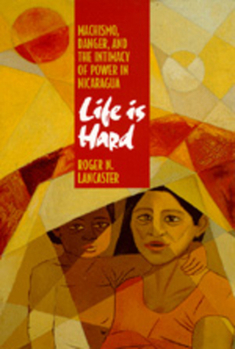Life Is Hard: Machismo, Danger, and the Intimacy of Power in Nicaragua
Select Format
Select Condition 
Book Overview
"Rambo took the barrios by storm: Spanish videotapes of the movie were widely available, and nearly all the boys and young men had seen it, usually on the VCRs of their family's more affluent friends. . . . As one young Sandinista commented, 'Rambo is like the Nicaraguan soldier. He's a superman. And if the United States invades, we'll cut the marines down like Rambo did.' And then he mimicked Rambo's famous war howl and mimed his arc of machine gun...
Format:Paperback
Language:English
ISBN:0520089294
ISBN13:9780520089297
Release Date:August 1994
Publisher:University of California Press
Length:368 Pages
Weight:1.10 lbs.
Dimensions:0.9" x 6.0" x 9.0"
Customer Reviews
2 ratings
Insightful look at life in Central America
Published by Thriftbooks.com User , 16 years ago
This book will charm your heart and open your eyes to life, love, and pain in Nicaragua. Written by an anthropologist who was an intimate member of a small, middle class community in Managua, his stories are full of emotion, power, and a definite ring of truth. If you want to learn more about Nicaraguan culture and life from a verifiable source, this book is for you. A must-read for any traveler or potential immigrant to the region.
Life is Hard
Published by Thriftbooks.com User , 24 years ago
When people want to know what everyday life in Nicaragua was like during what Eduardo Galeano has called "the time of beautiful madness," they invariably turn to Lancaster's book. Life is Hard gives an up-close, personal, and often poignant accounting of the experiences of three working-class families during the Sandinista period. But this accessible, engaging book is also more than a classic ethnography. The latter chapters (whose theoretical arguments ineluctably flow from the more descriptive chapters) provide a highly readable short course on much of what is most exciting in twentieth century cultural theory: semiotics, deconstruction, neomarxism, and the origins of queer theory.Over the course of the book, the author takes the reader through various vignettes, life stories, and analyses. At the same time, Lancaster reveals different facets of himself, in context-appropriate passages: socialist, Southern working-class origins, white, gay... The result is an implicit argument about how complex, compound, and contingent identities are. The result is also that alert readers get a very good sense of how the author's experiences shaped his research questions- and how they affected his interactions with Nicaraguan informants spanning a broad social gamut: single mothers, soldiers, adolescent boys and girls, "macho" men, and a number of gay men (clearly quoted, sometimes at length, in the chapter on same-sex relations).Lancaster's overarching analysis is complex. In a feminist vein, he argues that the Sandinista revolution failed, in part, because its leadership failed to undertake an effective renovation of gender relations and family life. In a gay studies vein, the author shows how the everyday stigmatization of male same-sex relations regulates and supports conceptions of "appropriate" manhood (nobody wants to be called a "queer"!)-- and how, in no small part, it was this quotidian homophobia that undermined Sandinista efforts at changing family life.The nuanced picture Lancaster draws of family life in a culture of machismo, and the innovative analysis he develops of how same-sex relations function in that culture, have been corroborated by a host of scholars working in different fields: Tomas Almaguer, Ana Alonso, Annick Prieuer, Don Kulick, David Whisnant, Richard Parker, and many others. With good reason, this important book received both the Society for the Study of Social Problems' C. Wright Mills Award, and the Society of Lesbian and Gay Anthropologists' Ruth Benedict Prize. I should add: this book has been used in several undergraduate and graduate courses I've taken. Invariably, students vote this the best-realized ethnography in the class.





